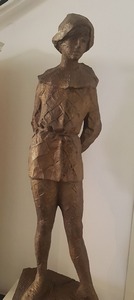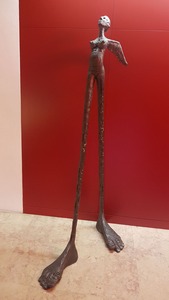stdClass Object
(
[id] => 16267
[title] => The Wonderful Art of Living
[alias] => the-wonderful-art-of-living
[introtext] => Greater Than Guilt/3 You can remain righteous even when you are weak. And listen without having heard
by Luigino Bruni
published in Avvenire on 04/02/2018
The Master said, 
“Those who make virtue their profession are the ruin of virtue.”
Confucius Quotes
There are many people on earth who are called and answer "here I am" even if they don’t know how to recognize the source of the voice that calls them by name. Yesterday, today, always. They are called by different and unknown inner voices lifted up by the love and pain of the world. It is really important to respond to these vocations that happen every day in all environments of the human race. But it is marvellous when there is an "Eli" next to us that first sends us back to bed and then reveals the name of the one who continues to call us.
[fulltext] => “Now the sons of Eli were worthless men... when any man offered sacrifice, the priest's servant would come, while the meat was boiling, with a three-pronged fork in his hand, and he would thrust it into the pan or kettle or cauldron or pot. All that the fork brought up the priest would take for himself” (1 Samuel 2:12-14). And what’s more, as if these bribes on sacrifices were not enough, “they lay with the women who were serving at the entrance to the tent of meeting” (2:22). But “the boy Samuel continued to grow both in stature and in favour with the Lord and also with man” (2:26). With its strong and colourful tones, making use of very ancient materials, this image makes us immediately enter into the great theme of the Bible and life. That is, the coexistence of guilt and grace, the dialectic between the temple and prophecy. The figure of Eli, the priest and head of the temple of Shiloh, also carries some ambivalence. The text - which is the result of different traditions and the work of many theological political "hands" - condemns above all his children, but does not exempt Eli himself from guilt (“you...honour your sons above me by fattening yourselves on the choicest parts of every offering” 2:29).
The night of Samuel's call is a grand episode, in which Eli plays a beautiful and decisive part. It is not necessary to be morally perfect to recognize the spirit of God in the world, nor to tell a young person, “It is the Lord”. One can remain righteous even if weak; one can be honest even if part of one’s soul has gone bad. Even the score of a morally dubious life may contain some beautiful parts. And the world is full of true and stupendous words uttered by sinners, of beautiful actions carried out by those who seemed capable only of wickedness - Cain wasn’t able to erase the image of Elohim from his children, either.
Samuel's vocation is prepared by a very suggestive verse: “And the word of the Lord was rare in those days; there was no frequent vision” (3:1). Samuel's time is a miserable time of the word and visions, that is, of prophecy (which is the two together). Samuel arrives to end this silence and this eclipse of God. Prophets, yesterday and today, are often the "flowers of evil", the earth's response to the famine of the word, words and visions. In a biblical world where the Word of God is the mother of all true human words, the rarity of YHWH's word translates into the fog, smoke, vanitas (havel) of human words. Adam does not know how to speak if God remains silent, he is a civilly and spiritually blind and dumb man.
“Samuel was lying down in the temple of the Lord, where the ark of God was. Then the Lord called Samuel, and he said, ‘Here I am!’ and ran to Eli and said, ‘Here I am, for you called me.’ But he said, ‘I did not call; lie down again.’ So he went and lay down. And the Lord called again, ‘Samuel!’ and Samuel arose and went to Eli and said, ‘Here I am, for you called me.’ But he said, ‘I did not call, my son; lie down again’” (3:3-6). The voice calls twice, Samuel does not recognize it. It calls a third time: “And he arose and went to Eli and said, ‘Here I am, for you called me.’ Then Eli perceived that the Lord was calling the boy” (3:8). It’s one of the most beautiful and deepest trialogues of all sacred literature. Here we find the grammar and semantics of that decisive anthropological event that we call vocations (religious, artistic or secular), especially in their auroral and therefore crucial phase. At the beginning there is a young man who carries his own destiny into his story, from that first vow made by his mother Hannah. He slept in the temple, next to the Ark of the Covenant, since he was consecrated to God and his worship ever since he was a small child. Religion was his environment, the temple his house, sacred words his language. However, “Samuel did not yet know the Lord, and the word of the Lord had not yet been revealed to him” (3:7). His was a spiritually miserable time, we know. But even in the rare times of abundant words, to know God and his word it is not enough to be immersed in a religious life. You can spend a whole life in sacred places, be consecrated and wear the linen dress every day without knowing God - like Eli's children, like the many religious professionals.
Unlike the vocations of Abraham, Isaiah, Jeremiah or Moses, in Samuel's call we find a human mediator, an intermediary, a third party appearing on the scene. In those other great biblical calls (Hagar’s, Mary’s), God reveals himself directly, or through his angel. Those who are called express doubts about their ability to perform the task, but they recognize the voice. And when they do not recognize it (Saul’s "who are you?") it is the voice itself that says its name. Samuel, however, does not recognize the voice, until its name is revealed to him by Eli.
This play of voices is particularly beautiful and important, a paradigm of the good process of discernment of spirits and vocations. First of all, Eli also needs three "calls" to recognize the nature of the voice. Perhaps, knowing Samuel very well, he had recognized the symptoms of his own prophetic call already in the first waking-up, but he wanted to wait. Being able to wait is the first precious art of the interpreters of the voices of others (and their own). Always, but especially in times of famine of God, when his memory is far away, and hunger and thirst generate frivolous morganas and voices. When the long-awaited and opportune time comes, Eli recognizes the signs of YHWH's voice in the voice calling Samuel. The text does not tell us the "technique" of this discernment, but it tells us something more important: Eli knows how to recognize the voice that calls someone else. A vocational hermeneute is someone who knows how to interpret the signs of a good and different voice among the many voices of life. This is, perhaps, his most rare and precious skill, precisely: being able to say "it is the Lord" without being able to listen directly to the voice. Like Joseph in Egypt, Eli becomes the interpreter of the "dreams" of others - every true vocation begins in a dream, because the time of vigil is too short to make us hear these voices of infinity. Eli was not a prophet, probably he had never heard himself being called by name. You don’t have to be a prophet to accompany a prophet; "only" a charisma, some experience, and much honesty are needed. Eli didn't know the voice but he knew the word of YHWH. He was familiar with the narratives of the great calls of salvation history. Having experienced the word allowed him to recognize a voice that he had never heard but had listened to in the temple and under the tent by the fathers. A life spent listening to the word allowed him to get prepared for the more important appointment with a voice speaking to a young man. To recognise it and, at the right time, to be able to say with certainty: "It is the Lord”. His was a life dedicated to the knowledge of the word in order to be able to recognize the voice speaking to a young person as an old man, because the word that he had heard so often resounded inside him as if it were a voice. Spiritually active communities are made up of a few prophets called by name and many other listeners of a word that does not call them by name but becomes a voice in their soul. The word allows many non-prophets to experience something similar (if not identical) as the prophets called by name - this is a real equality under the sun, beyond the diversity of charismas and talents. It is eminently the biblical word that allows for this, but so do true listening and serious frequentation of every great human word, too. And we can recognize real poets without being poets. We may not be virtuous, but we may recognize virtue in others. And then we would have learned the wonderful art of living. At this point Eli can give Samuel the most valuable piece of advice, and conclude his task: “Go, lie down, and if he calls you, you shall say, ‘Speak, Lord, for your servant (firned/ally) hears’” (3:9).
Finally, that "if he calls you” is very important. An experienced and honest companion can recognize the signs of a vocation, can be sure of the authenticity of the voice that broke into the night, but cannot know if the voice will return to call for the fourth, decisive time. There are people who listened to their name being called three times, an Eli said to them "it is the Lord", they went back to sleep and they have been asleep for years waiting for the fourth call that does not arrive. There are others who have not slept for a long time because a real voice keeps calling them inside and does not leave them in peace. However, they found a dishonest interpreter along the way who responded “Yes, it’s me” to the question: “Did you call me?”, and became their “inner priest”. Others still have a hermeneute by their side who is dishonest (and/or impatient and/or inexperienced and/or lacking charisma) in a different way, and responded: "It is the Lord”. Thus they listen to and follow a banal or wrong voice that they call "the Lord", and find themselves in vocational lives without vocations. There are very few manipulations, done more or less in good faith, that are more devastating than vocational ones. If Samuel arrives, at night, and asks us the question: “Did you call me?” and we are not Eli the only answer we should give is: “I don’t know who is calling you. All I know is that it isn’t me. But keep listening.”
In times of the famine of voices and visions, Hannahs and Samuels are needed. But there is also a great need for the honest humanity of Eli: “So Samuel went and lay down in his place. And the Lord came and stood, calling as at other times, ‘Samuel! Samuel!’ And Samuel said, ‘Speak, for your servant hears’” (3:9).
download article in pdf
[checked_out] => 0
[checked_out_time] => 0000-00-00 00:00:00
[catid] => 847
[created] => 2018-02-03 08:08:00
[created_by] => 64
[created_by_alias] => Luigino Bruni
[state] => 1
[modified] => 2020-08-23 18:41:25
[modified_by] => 609
[modified_by_name] => Super User
[publish_up] => 2018-02-08 04:35:00
[publish_down] => 0000-00-00 00:00:00
[images] => {"image_intro":"","float_intro":"","image_intro_alt":"","image_intro_caption":"","image_fulltext":"","float_fulltext":"","image_fulltext_alt":"","image_fulltext_caption":""}
[urls] => {"urla":false,"urlatext":"","targeta":"","urlb":false,"urlbtext":"","targetb":"","urlc":false,"urlctext":"","targetc":""}
[attribs] => {"article_layout":"","show_title":"","link_titles":"","show_tags":"","show_intro":"","info_block_position":"","info_block_show_title":"","show_category":"","link_category":"","show_parent_category":"","link_parent_category":"","show_associations":"","show_author":"","link_author":"","show_create_date":"","show_modify_date":"","show_publish_date":"","show_item_navigation":"","show_icons":"","show_print_icon":"","show_email_icon":"","show_vote":"","show_hits":"","show_noauth":"","urls_position":"","alternative_readmore":"","article_page_title":"","show_publishing_options":"","show_article_options":"","show_urls_images_backend":"","show_urls_images_frontend":""}
[metadata] => {"robots":"","author":"","rights":"","xreference":""}
[metakey] =>
[metadesc] => The narrative structure of Samuel's vocation, one of the most famous and splendid passages of the Bible, introduces us to the mystery of calls and the processes of accompanying vocations, where honesty is the scarcest and most precious resource.
[access] => 1
[hits] => 2147
[xreference] =>
[featured] => 0
[language] => en-GB
[on_img_default] =>
[readmore] => 10587
[ordering] => 82
[category_title] => EN - Greater Than Guilt
[category_route] => commenti-biblici/serie-bibliche/piu-grandi-della-colpa
[category_access] => 1
[category_alias] => en-greater-than-guilt
[published] => 1
[parents_published] => 1
[lft] => 129
[author] => Luigino Bruni
[author_email] => ferrucci.anto@gmail.com
[parent_title] => IT - Serie bibliche
[parent_id] => 773
[parent_route] => commenti-biblici/serie-bibliche
[parent_alias] => serie-bibliche
[rating] => 0
[rating_count] => 0
[alternative_readmore] =>
[layout] =>
[params] => Joomla\Registry\Registry Object
(
[data:protected] => stdClass Object
(
[article_layout] => _:default
[show_title] => 1
[link_titles] => 1
[show_intro] => 1
[info_block_position] => 0
[info_block_show_title] => 1
[show_category] => 1
[link_category] => 1
[show_parent_category] => 1
[link_parent_category] => 1
[show_associations] => 0
[flags] => 1
[show_author] => 0
[link_author] => 0
[show_create_date] => 1
[show_modify_date] => 0
[show_publish_date] => 1
[show_item_navigation] => 1
[show_vote] => 0
[show_readmore] => 0
[show_readmore_title] => 0
[readmore_limit] => 100
[show_tags] => 1
[show_icons] => 1
[show_print_icon] => 1
[show_email_icon] => 1
[show_hits] => 0
[record_hits] => 1
[show_noauth] => 0
[urls_position] => 1
[captcha] =>
[show_publishing_options] => 1
[show_article_options] => 1
[save_history] => 1
[history_limit] => 10
[show_urls_images_frontend] => 0
[show_urls_images_backend] => 1
[targeta] => 0
[targetb] => 0
[targetc] => 0
[float_intro] => left
[float_fulltext] => left
[category_layout] => _:blog
[show_category_heading_title_text] => 0
[show_category_title] => 0
[show_description] => 0
[show_description_image] => 0
[maxLevel] => 0
[show_empty_categories] => 0
[show_no_articles] => 1
[show_subcat_desc] => 0
[show_cat_num_articles] => 0
[show_cat_tags] => 1
[show_base_description] => 1
[maxLevelcat] => -1
[show_empty_categories_cat] => 0
[show_subcat_desc_cat] => 0
[show_cat_num_articles_cat] => 0
[num_leading_articles] => 0
[num_intro_articles] => 14
[num_columns] => 2
[num_links] => 0
[multi_column_order] => 1
[show_subcategory_content] => -1
[show_pagination_limit] => 1
[filter_field] => hide
[show_headings] => 1
[list_show_date] => 0
[date_format] =>
[list_show_hits] => 1
[list_show_author] => 1
[list_show_votes] => 0
[list_show_ratings] => 0
[orderby_pri] => none
[orderby_sec] => rdate
[order_date] => published
[show_pagination] => 2
[show_pagination_results] => 1
[show_featured] => show
[show_feed_link] => 1
[feed_summary] => 0
[feed_show_readmore] => 0
[sef_advanced] => 1
[sef_ids] => 1
[custom_fields_enable] => 1
[show_page_heading] => 0
[layout_type] => blog
[menu_text] => 1
[menu_show] => 1
[secure] => 0
[helixultimatemenulayout] => {"width":600,"menualign":"right","megamenu":0,"showtitle":1,"faicon":"","customclass":"","dropdown":"right","badge":"","badge_position":"","badge_bg_color":"","badge_text_color":"","layout":[]}
[helixultimate_enable_page_title] => 1
[helixultimate_page_title_alt] => Più grandi della colpa
[helixultimate_page_subtitle] => Commenti Biblici
[helixultimate_page_title_heading] => h2
[page_title] => Greater Than Guilt
[page_description] =>
[page_rights] =>
[robots] =>
[access-view] => 1
)
[initialized:protected] => 1
[separator] => .
)
[displayDate] => 2018-02-03 08:08:00
[tags] => Joomla\CMS\Helper\TagsHelper Object
(
[tagsChanged:protected] =>
[replaceTags:protected] =>
[typeAlias] =>
[itemTags] => Array
(
)
)
[slug] => 16267:the-wonderful-art-of-living
[parent_slug] => 773:serie-bibliche
[catslug] => 847:en-greater-than-guilt
[event] => stdClass Object
(
[afterDisplayTitle] =>
[beforeDisplayContent] =>
[afterDisplayContent] =>
)
[text] => Greater Than Guilt/3 You can remain righteous even when you are weak. And listen without having heard
by Luigino Bruni
published in Avvenire on 04/02/2018
The Master said, 
“Those who make virtue their profession are the ruin of virtue.”
Confucius Quotes
There are many people on earth who are called and answer "here I am" even if they don’t know how to recognize the source of the voice that calls them by name. Yesterday, today, always. They are called by different and unknown inner voices lifted up by the love and pain of the world. It is really important to respond to these vocations that happen every day in all environments of the human race. But it is marvellous when there is an "Eli" next to us that first sends us back to bed and then reveals the name of the one who continues to call us.
[jcfields] => Array
(
)
[type] => intro
[oddeven] => item-odd
)







 «Dammi da mangiare
«Dammi da mangiare “The Bible knows lament. Lament is an extremely critical moment in the relationship with God, until God consoles man and man consoles God. Prophecy and liturgy bring laments back and forth between heaven and earth.”
“The Bible knows lament. Lament is an extremely critical moment in the relationship with God, until God consoles man and man consoles God. Prophecy and liturgy bring laments back and forth between heaven and earth.”